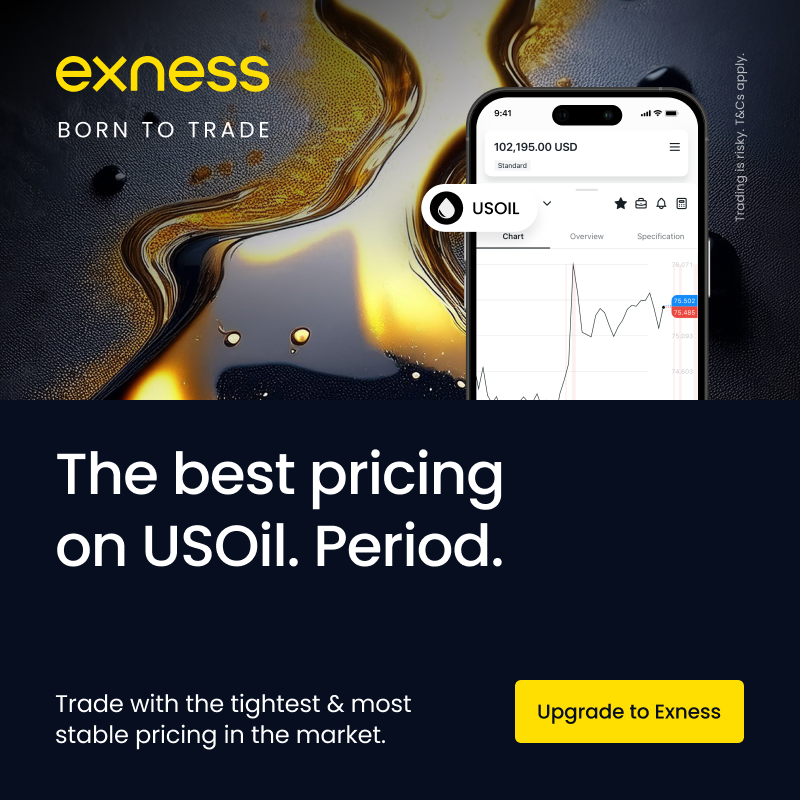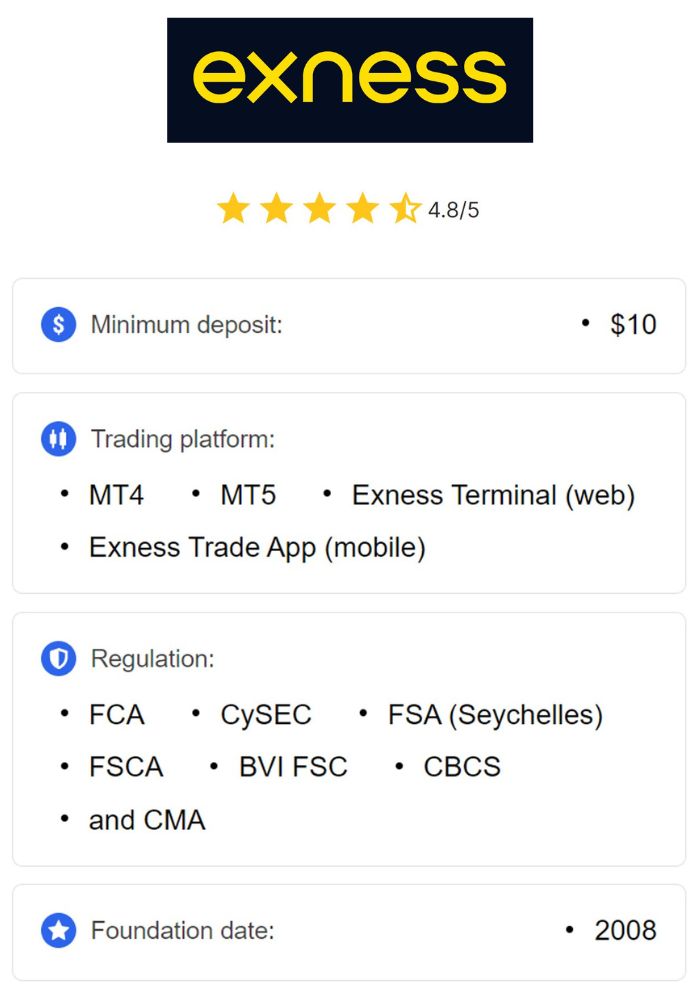
9 minute read
Exness vs Vantage Comparison | Which is better?
from Exness Global
In the dynamic world of forex trading, choosing the right broker is a critical decision that can shape your trading journey. With countless options available, two names often stand out: Exness vs Vantage. Both brokers have built solid reputations, offering traders a mix of innovative tools, competitive conditions, and reliable services. But which one is better suited to your needs? In this in-depth Exness vs Vantage comparison, we’ll explore every facet of these platforms—regulation, trading platforms, fees, account offerings, and more—to help you decide which broker reigns supreme in 2025.

💥 Trade with Exness now: Open An Account or Visit Brokers
Whether you’re a beginner dipping your toes into forex or an experienced trader seeking optimal conditions, this guide will provide clarity. Let’s dive into the details and uncover the strengths and weaknesses of Exness and Vantage.
What Makes a Great Forex Broker?
Before comparing Exness vs Vantage, it’s worth understanding what defines an exceptional forex broker. A top-tier broker should offer:
Regulation and Security: Protection of funds and compliance with financial authorities.
Trading Platforms: User-friendly, feature-rich platforms for seamless trading.
Competitive Fees: Low spreads, minimal commissions, and transparent pricing.
Account Flexibility: Options for traders of all levels, from novices to professionals.
Asset Variety: Access to forex, commodities, indices, and more.
Customer Support: Responsive assistance to resolve issues quickly.
With these benchmarks in mind, let’s evaluate how Exness and Vantage stack up in this head-to-head showdown.
Overview of Exness
Founded in 2008, Exness has grown into one of the most recognized names in forex trading. Headquartered in Cyprus, the broker operates globally, serving millions of clients across continents. Exness prides itself on transparency, cutting-edge technology, and a client-centric approach. It’s known for offering tight spreads, high leverage, and a wide range of tradable assets, making it a favorite among both retail and institutional traders.
Exness has earned a reputation for its lightning-fast execution speeds and robust trading infrastructure. Its mission? To empower traders with the tools they need to succeed in volatile markets.
Overview of Vantage
Vantage, established in 2009, is an Australian-based broker that has carved a niche as a multi-asset trading platform. With a focus on delivering superior execution and a broad selection of instruments, Vantage caters to traders worldwide. The broker emphasizes advanced technology, competitive pricing, and a commitment to customer satisfaction.
Regulated by top-tier authorities, Vantage has positioned itself as a reliable choice for those seeking flexibility and diversity in their trading portfolios. From forex to cryptocurrencies, Vantage offers something for everyone.
Regulation and Safety: Which Broker is More Secure?
When entrusting your money to a broker, safety is paramount. Let’s examine how Exness vs Vantage ensure client protection.
Exness Regulation
Exness operates under multiple regulatory bodies, showcasing its commitment to transparency and security:
Financial Conduct Authority (FCA) in the UK: A gold standard in regulation, ensuring strict oversight.
Cyprus Securities and Exchange Commission (CySEC): A reputable EU regulator enforcing fund segregation and compliance.
Financial Services Authority (FSA) in Seychelles: For its international operations.
This multi-jurisdictional regulation means Exness adheres to rigorous standards, including segregating client funds from company assets and offering negative balance protection. Traders can feel confident their investments are safeguarded.
Vantage Regulation
Vantage also boasts strong regulatory credentials:
Australian Securities and Investments Commission (ASIC): One of the world’s most respected regulators, known for its stringent rules.
Vanuatu Financial Services Commission (VFSC): Oversees its offshore operations.
Cayman Islands Monetary Authority (CIMA): Adds an extra layer of credibility.
Like Exness, Vantage segregates client funds and provides negative balance protection. However, its secondary regulation under VFSC may not carry the same weight as FCA or CySEC for some traders.
Verdict: Regulation
Both brokers are well-regulated, but Exness edges out slightly with its FCA and CySEC oversight, offering a higher level of trust for traders prioritizing top-tier regulation. Vantage’s ASIC license is impressive, but its VFSC regulation may raise eyebrows among cautious investors.
Trading Platforms: Tools for Success
The trading platform is your gateway to the markets. Let’s compare the options provided by Exness and Vantage.
Exness Trading Platforms
Exness supports a variety of platforms to suit different trading styles:
MetaTrader 4 (MT4): The industry standard, loved for its simplicity and robust charting tools.
MetaTrader 5 (MT5): An advanced version with more features, including additional timeframes and order types.
Exness Terminal: A proprietary web-based platform offering a sleek, intuitive interface.
Mobile Apps: Fully functional apps for iOS and Android, ensuring trading on the go.
Exness enhances its platforms with fast execution speeds and customizable tools, appealing to both beginners and seasoned traders.
Vantage Trading Platforms
Vantage also offers a solid lineup:
MetaTrader 4 (MT4): Reliable and widely used, with extensive plugin support.
MetaTrader 5 (MT5): Packed with modern features for advanced traders.
WebTrader: A browser-based option for quick access without downloads.
Vantage App: A mobile solution with real-time data and trading capabilities.
TradingView Integration: A standout feature, offering cutting-edge charting for technical analysts.
Vantage’s integration with TradingView gives it a unique edge for traders who rely on sophisticated charting.
Verdict: Trading Platforms
Exness provides a streamlined experience with its proprietary terminal, while Vantage appeals to technical traders with TradingView. If you value simplicity and speed, Exness wins. For advanced charting, Vantage takes the lead.
Fees and Spreads: Where’s the Best Value?
Trading costs can make or break your profitability. Let’s break down the fee structures of Exness vs Vantage.
Exness Fees
Exness is renowned for its competitive pricing:
Spreads: Variable spreads starting as low as 0.0 pips on its Raw Spread and Zero accounts.
Commissions: $3.5 per lot per side on Raw Spread accounts; commission-free on Standard accounts.
Swap Fees: Offers swap-free accounts for Islamic traders or those avoiding overnight costs.
Inactivity Fees: None, making it ideal for occasional traders.
Exness’s ultra-low spreads and flexible fee options cater to high-volume traders and cost-conscious beginners alike.
Vantage Fees
Vantage also keeps costs competitive:
Spreads: Fixed spreads on Standard accounts (from 1.0 pips) and variable spreads on ECN accounts (from 0.0 pips).
Commissions: $3 per lot per side on RAW ECN accounts; no commissions on Standard accounts.
Swap Fees: Swap-free accounts available for eligible clients.
Inactivity Fees: $10 per month after six months of inactivity.
Vantage’s pricing suits traders who prefer fixed spreads, though its inactivity fee could deter infrequent users.
Verdict: Fees
Exness offers tighter spreads and no inactivity fees, giving it an edge for active traders. Vantage’s fixed-spread option is attractive for beginners, but its fees may add up over time.

💥 Trade with Exness now: Open An Account or Visit Brokers
Account Types: Flexibility for All Traders
A broker’s account offerings should match your trading goals. Here’s how Exness vs Vantage compare.
Exness Account Types
Exness provides a range of accounts:
Standard Account: No commissions, spreads from 0.3 pips, ideal for beginners.
Standard Cent Account: Micro-lot trading for risk-averse novices.
Raw Spread Account: Ultra-low spreads (from 0.0 pips) with a small commission.
Zero Account: Zero spreads on select instruments, plus commissions.
Pro Account: Instant execution and tight spreads for professionals.
Exness’s variety ensures options for every trader, from micro-lot enthusiasts to high-frequency scalpers.
Vantage Account Types
Vantage offers three main accounts:
Standard STP Account: Commission-free, spreads from 1.0 pips, great for newbies.
RAW ECN Account: Spreads from 0.0 pips with a $3 commission per lot.
PRO ECN Account: Designed for pros, with lower commissions ($2 per lot) and tight spreads.
Vantage keeps it simple but effective, catering to both casual and serious traders.
Verdict: Account Types
Exness wins with its broader selection, including the unique Standard Cent account. Vantage’s streamlined options are solid but less diverse.
Tradable Assets: Diversifying Your Portfolio
A broker’s asset range determines your trading opportunities. Let’s see what’s on offer.
Exness Assets
Exness provides access to:
Forex (100+ pairs)
Metals (gold, silver)
Cryptocurrencies (Bitcoin, Ethereum, etc.)
Energies (oil)
Stocks and Indices
Commodities
This extensive lineup allows traders to explore multiple markets beyond forex.
Vantage Assets
Vantage boasts over 1,000 instruments:
Forex (40+ pairs)
Indices
Commodities (gold, oil, etc.)
Cryptocurrencies
Shares (US, UK, AU markets)
ETFs and Bonds
Vantage’s inclusion of shares and ETFs gives it a diversification advantage.
Verdict: Assets
Vantage outshines Exness with its wider asset range, especially for stock and ETF traders. Exness holds its own with a strong forex and crypto focus.
Deposit and Withdrawal Options: Ease of Funding
Smooth transactions are essential for any trader. How do Exness and Vantage compare?
Exness Deposits and Withdrawals
Methods: Bank cards, e-wallets (Skrill, Neteller), crypto, and local payment systems.
Minimum Deposit: $10 for Standard accounts.
Processing: Instant deposits; withdrawals processed within 24 hours.
Fees: No deposit or withdrawal fees.
Exness’s low entry point and fee-free transactions are a major plus.
Vantage Deposits and Withdrawals
Methods: Bank transfers, cards, e-wallets (PayPal, UPI, etc.), and over 50 options in some regions.
Minimum Deposit: $50 for Standard accounts.
Processing: Instant deposits; withdrawals within 1-2 business days.
Fees: Some withdrawal methods incur fees.
Vantage offers more payment variety but charges fees on certain withdrawals.
Verdict: Funding
Exness takes the lead with lower minimums and no fees, though Vantage’s extensive options appeal to specific regions.
Customer Support: Who’s There When You Need Them?
Reliable support can save the day. Let’s compare.
Exness Support
Channels: Live chat, email, phone.
Availability: 24/7 in multiple languages.
Quality: Known for quick, helpful responses.
Exness’s round-the-clock support is a lifeline for global traders.
Vantage Support
Channels: Live chat, email, phone.
Availability: 24/5, with some weekend support.
Quality: Generally responsive, though some report delays.
Vantage’s support is solid but doesn’t match Exness’s 24/7 availability.
Verdict: Support
Exness wins with its always-on, multilingual assistance.
Education and Resources: Empowering Traders
Learning resources can boost your skills. Here’s what each broker offers.
Exness Resources
Webinars and tutorials
Market analysis
Trading calculators
Exness provides decent tools, though its focus is more on trading execution.
Vantage Resources
Webinars and eBooks
Market news and analysis
Trading Central integration
Vantage’s educational offerings are more robust, especially for beginners.
Verdict: Education
Vantage excels with its comprehensive resources, while Exness keeps it basic.
Final Verdict: Exness vs Vantage—Which is Better?
After dissecting every angle, here’s the conclusion:
Choose Exness if: You prioritize ultra-low spreads, no fees, 24/7 support, and a variety of account types. It’s ideal for forex-focused traders and those seeking cost efficiency.
Choose Vantage if: You value asset diversity, TradingView integration, and educational support. It’s perfect for multi-asset traders and beginners needing guidance.
Ultimately, the “better” broker depends on your priorities. Exness shines for cost-conscious, active traders, while Vantage appeals to those seeking flexibility and learning tools. Evaluate your goals, test their demo accounts, and pick the one that aligns with your trading style in 2025.
FAQs
1. Is Exness or Vantage better for beginners?
Vantage is slightly better for beginners due to its educational resources and fixed-spread accounts, though Exness’s low minimum deposit and Standard Cent account are also beginner-friendly.
2. Which broker has lower fees?
Exness generally offers lower costs with tighter spreads and no withdrawal fees, while Vantage’s fees can vary depending on account type.
3. Can I trade cryptocurrencies with both brokers?
Yes, both Exness vs Vantage offer crypto trading, though Vantage provides a broader range of assets overall.
4. Are Exness and Vantage regulated?
Yes, both are regulated by reputable authorities—Exness by FCA and CySEC, and Vantage by ASIC and VFSC.
💥 Trade with Exness now: Open An Account or Visit Brokers
Read more:

